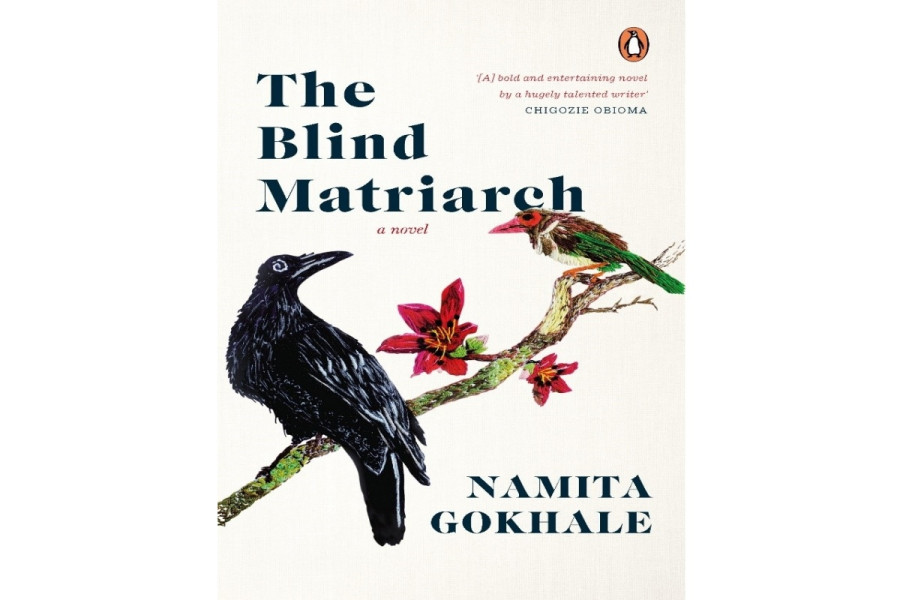Books
A classic born out of contemporary trauma
The Blind Matriarch’ by Namita Gokhale captures a picture of middle-class life battling the pandemic.
Richa Bhattarai
Namita Gokhale is already a person of many talents –a writer, editor, publisher, and festival director. But she deserves one more accolade, as the consistent creator of interesting women protagonists.
In 1984, she introduced the world to Paro. Seductive, impulsive, and far ahead of her times. Thirty-seven years and plenty of remarkable women characters later, Gokhale has given us another unforgettable protagonist in Matangi-Ma. The blind matriarch lives on the top floor of a four-storied house, unseeing yet all-knowing. She might be elderly and disabled, but she rules the household in subtle ways, aided by her help and companion, Lali.
Her slightly unusual family is made up of a distant son, another devoted but impractical son, an impatient daughter-in-law, an affectionate daughter, and two loving grandsons. Into this melee are interwoven house helps and their families, neighbours, pets, the police, and even strangers. We are allowed a glimpse into their lives in March 2020, when the Covid-19 pandemic has just begun its frightening journey around the world. As the pandemic spreads, we follow the matriarch and her family as they navigate the fear, uncertainty, chaos, disinformation, and irreversible changes that have underlined our lives for the past two years.
This documentation of pandemic sufferance is as vivid as though it were happening in our lives, and as poignant as if it had uprooted us. This collection and depiction of collective trauma is what makes ‘The Blind Matriarch’ special–as though Gokhale had written the novel for each one of us that has been deeply affected by the pandemic in one way or the other.
What makes it even more interesting is that the pandemic is experienced through the ‘eyes’ of Matangi-Ma, who rarely left the confines of her apartment before the lockdown in her city. But even she is rattled by this strange and unthinkable malaise that has swept through her city, touching one and all. In her upper-middle class cocoon, surrounded by loving members, she is perhaps offered better protection than the rest of the world. But her family members are affected in ways that hit too close to home.
Ritika, the daughter-in-law, covers her head with a pillow and screams, unable to take the frustration of losing her job and being closeted inside her home.
Rahul, her son, pens a poem:
Lockdown, lockdown, lock, lock, lock
Shutdown, shutdown, shut, shut, shut
Meanwhile, Ritika’s sister-in-law, Shanta, lends us the hope we desperately need. “Things would open up again, the world would return to its old ways, and this oppressive sense of being stuck in a lift which was not moving, which might never move, this would pass too.”
This oscillation between hope and despair is the foundation of this relatable novel. At times the pandemic seems but a lull in our daily routine, the deaths only statistics, the newspapers abetting the fear mongering. But then it hits so close to home that it engulfs our entire selves and there seems no way to escape. Indeed, in an interesting twist, Gokhale calls Vikram Sambat 2078 ‘Rakshasa’—the year of the demon—per the Hindu calendar.
Vikram Sambat 2078. It was the end of an era. The end of an epoch.
The novel is sprinkled with simple, old-world descriptions that evoke a sense of the classic, of writing reminiscent of a lost era. This description, for example: They were seated on the dusty cane chairs she had dragged out from the front porch. Anna’s heart was set on a candlelight dinner, so she brought out a torch and upended it to simulate a flame. There was a buzz of mosquitoes around them. She squished a shower of herbal insect repellent on his face, his arms. Her husband regarded her fondly from across the table.
Like many of Gokhale’s novels, there are instances of mystery and the mystic, the spiritual and otherworldly. Matangi-Ma’s omniscience is depicted in unnerving ways, most notably in her interactions with a bird.
The best descriptions in the novel, though, are reserved for food. There are besan laddoos, garlic bread served in a candlelit dinner, the premise of idli with coconut chutney, a delicious sounding recipe for gujiyas, a man who loves pakodas and chhole puri (and other people’s wives), ripe alphonsos, masala chai, litti-chokha, ramsalan, nimona, a policewoman shown appreciation with a plate of rajma-chawal. This is also a juxtaposition of the indulgence of the middle and upper classes as others around them struggle to have a square meal a day.
There is little that Gokhale misses with her razor-sharp observation. The banging of utensils during the ‘janta lockdown’, the reaction of the common person to this senseless cacophony, the tribulations of citizens living hand-to-mouth, the shortage of oxygen cylinders, the dejection of medical personnel, washed up corpses, political opponents, the mayhem and apathy, even the general feeling of doom multiplied by two popular actors’ deaths.
The novel has a couple of sub-plots that add little to the story, for example, the convoluted disappearance of the Sens. It seems to be an important point in the story, and then peters off into nothing. There can also be a repetition of the mundane, where days pass but little happens, or at least of little consequence, and we have to keep tracking the family in their dull routines.
But at the end, it all ties together, with a gentleness and grace that is a tribute to the matriarch we have learnt so much about and grown to care for.
Somewhere in the middle of the novel, Matangi-Ma exhorts young people to stop feeling sorry for themselves. “Look at me,” she says, “I have been a good wife, a good mother, but what has life ever given me? It’s given me darkness, it’s left me blind. I’m stuck here, all alone, waiting for my end. Did I deserve this? No! Do I wish I had lived some more, known some more, experienced some more? Yes!”
This atypical outburst is also, perhaps, an admonishment to all of us – to live our life a little more exuberantly than we would otherwise have done. To know some more. To experience some more.
The Blind Matriarch
Author: Namita Gokhale
Publisher: Penguin Random House India
Pages: 207
Price: INR 599




 17.12°C Kathmandu
17.12°C Kathmandu










